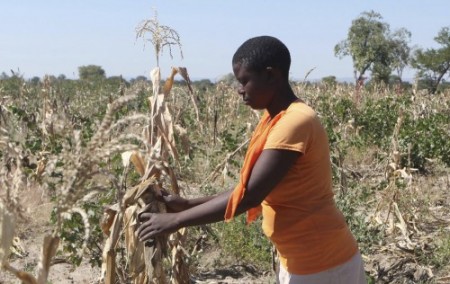January 10, 2016 – Drought in Southern Africa is causing widespread crop failures in a number of countries. It extends from South Africa to Zimbabwe, Malawi, Zambia and Tanzania. The cause – El Nino. The impending disaster – as many as 10 million are facing famine.
Where many African countries have implemented legislation banning planting of genetically modified crops, largely because of the fear of cross contamination with non GMO plants, the drought has produced an about face. In Zimbabwe where the importation of GMO corn is banned, even emergency shipments of food are carefully scrutinized. But now government officials facing a food crisis are changing their tune.
Jonathan Mufandaedza, Chief Executive of Zimbabwe’s National Biotechnology Authority states “GM crops are one of the alternative solutions for reducing hunger on the continent.” Considering that 16% of the country’s population will require famine relief in 2016, Zimbabwe will import up to 700,000 tons of corn (maize), an important staple food crop. South Africa is the only country in the region that currently grows GMO corn. Neighbouring Zambia and Tanzania, also experiencing drought, have banned GMO crops. Traditionally Zimbabwe has purchased corn and other food staples from them but they are also facing potential famine.
Zambia in the last month indicated that it intends to lift the ban on GMO. States Michael Kaingu, Minister of Higher Education, “we recognize that modern biotechnology has advanced worldwide and, as a nation, we cannot afford to ignore the benefits of this technology. We are alert and prepared to deal with possible adverse risks.”
Misinformation proffered by anti-GMO advocates including Greenpeace have perpetuated a climate of fear around the biotechnology advances that could provide a means for farmers to produce crops in drought conditions. They have introduced into the lexicon the word “frankenfood” to frighten. And they have been very successful advocates for banning GMO crops in the European Union and countries that trade with Europe.
A GMO drought resistant corn, a readily available solution is not being planted in many sub-Saharan countries where climate scientists believe the continent will increasingly be prone to drought conditions. Sub-Saharan countries are not making the necessary investment to do their own research on GMO. Relying on third-party misinformation has put them in a pickle. And now with deteriorating conditions in the southern part of the continent there is little time left to implement appropriate scientific investigation. Lives are at stake and whether planting GMO or importing GMO, the nations affected no longer have any wiggle room.









